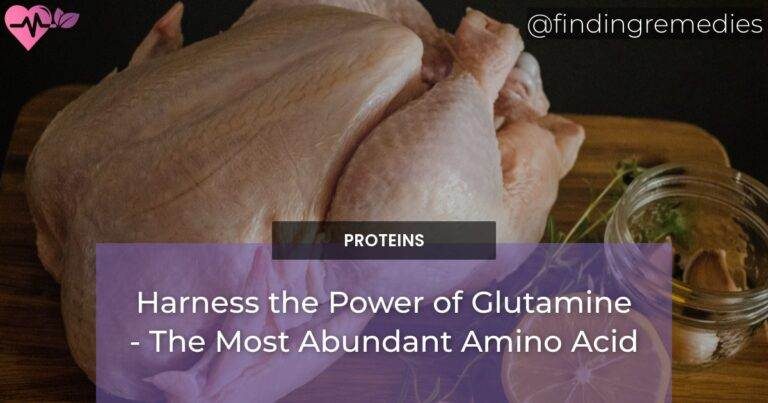Glutamine, the most abundant non-essential amino acid in the human body, holds tremendous power when it comes to supporting various physiological functions. From protein synthesis and muscle growth to immune system support and energy production, glutamine plays a vital role in maintaining overall health. Understanding the structure and characteristics of glutamine is essential to comprehend its significance.
What is Glutamine?
Glutamine – The Most Abundant Amino Acid
Glutamine, also known as L-glutamine, is an amino acid classified as non-essential, meaning it can be synthesized by the body. Its abundance in the human body highlights its importance. Glutamine accounts for around 60% of the amino acids present in skeletal muscle and is found in various tissues, including the lungs, liver, brain, and digestive system.
Glutamine Structure and Characteristics
The chemical structure of glutamine consists of a side chain attached to the backbone of the amino acid. This side chain contains an amide group, making glutamine an amide derivative of glutamic acid. The unique structure of glutamine enables it to perform multiple functions within the body.
Why Glutamine is Important
ALSO READ
Key Functions of Glutamine in the Body
Glutamine plays a crucial role in several physiological processes, contributing to overall well-being. Its key functions include:
Protein Synthesis and Muscle Growth
Glutamine serves as a building block for protein synthesis, a fundamental process for muscle growth and repair. It aids in maintaining a positive nitrogen balance, essential for muscle tissue preservation and development.
Immune System Support
Glutamine is vital for immune system function, as it fuels the activity of immune cells. It helps regulate the growth and differentiation of immune cells, enhancing the body’s defense against pathogens and promoting overall immune health.
Intestinal Health and Gut Barrier Function
The cells lining the intestines utilize glutamine as a primary energy source. It contributes to the maintenance of healthy intestinal tissue and the integrity of the gut barrier, preventing the entry of harmful substances into the bloodstream.
Energy Production and Recovery
In times of stress, such as intense exercise or injury, glutamine becomes a significant energy source for cells, particularly those of the immune system and the digestive tract. It aids in energy production, helping the body recover from physical and metabolic stress.
Glutamine Roles in the Body
Glutamine as a Precursor for Other Molecules
Glutamine serves as a precursor for various molecules that play crucial roles in the body. Two notable examples include:
Glutamine and Glutathione
Glutathione, a powerful antioxidant, relies on glutamine for its synthesis. Glutathione helps protect cells from oxidative damage and supports detoxification processes.
Glutamine and Nitric Oxide
Glutamine contributes to the production of nitric oxide, a molecule involved in vasodilation and blood flow regulation. Optimal nitric oxide levels promote cardiovascular health and exercise performance.
Glutamine as a Fuel Source for Cells
Glutamine serves as a readily available energy source for various cells, including those of the immune system, intestinal lining, and certain cancer cells. It helps sustain cellular energy production during times of increased demand.
Glutamine Benefits
Enhancing Exercise Performance and Recovery
Supplementing with glutamine has been shown to improve exercise performance by reducing muscle fatigue and enhancing muscle recovery. It aids in reducing exercise-induced muscle damage and supports post-workout muscle repair.
Supporting Immune Function
Glutamine plays a vital role in maintaining optimal immune function. It helps enhance the activity of immune cells, reducing the risk of infections and supporting overall immune health.
Promoting Gut Health
By supporting the integrity of the gut barrier and providing energy to intestinal cells, glutamine promotes gut health. It aids in maintaining a healthy digestive system and may help alleviate certain gastrointestinal conditions.
Glutamine Food Sources
Natural Dietary Sources of Glutamine
Glutamine can be obtained from various food sources, including:
- Poultry
- Fish
- Dairy products
- Eggs
- Legumes
- Spinach
- Cabbage
Supplementation with Glutamine
In certain cases, such as intense exercise or specific medical conditions, supplementation with glutamine may be beneficial. It is available in powder, capsule, or liquid form and should be used under professional guidance.
How Does Glycine Compare to Glutamine in Terms of Health Benefits?
Glycine and glutamine offer surprising benefits to health. Glycine aids in improving sleep quality, supports cognitive function, and promotes a healthy immune system. On the other hand, glutamine helps in muscle recovery, strengthens the gut lining, and supports the immune system. Both amino acids offer unique advantages for overall health and wellness.
Glutamine Dosage
Recommended Daily Intake of Glutamine
The recommended daily intake of glutamine varies depending on factors such as age, body weight, and specific health conditions. Generally, a daily dose of 5-10 grams is considered safe and effective for most individuals.
Dosage for Specific Purposes (e.g., athletes, recovery)
For athletes and those focusing on exercise recovery, higher doses of up to 20 grams per day may be beneficial. However, personalized advice from a healthcare professional or sports nutritionist is recommended.
Potential Side Effects and Interactions with Medications
Glutamine supplementation is generally safe for most individuals. However, in rare cases, it may cause mild side effects such as gastrointestinal discomfort. Additionally, individuals taking certain medications or with specific health conditions should consult their healthcare provider before starting glutamine supplementation.

